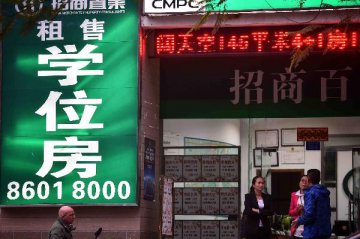
The industry believes that future policies will aim to curb surging house prices in tier-1 cities and boost sluggish real estate markets in other cities.
Recent rumors that real estate policies in tier-1 cities will tighten up are approved to be true. Shanghai and Shenzhen have launched a slew of policies in succession, including increasing down payment requirements, raising purchase threshold of non-local buyers, intensifying management on intermediary agents and cracking down on leveraged house purchase.
Insiders hold that the motive behind the new policies launched by tier-1 cities is to curb surging prices in recent period and crack down on emerging house speculations. Therefore, future policies will aim to curb surging house prices in tier-1 cities and boost sluggish real estate markets in other cities. Excluding cities seeing fast growing house price such as Shanghai and Shenzhen, the regulation policies in other cities won’t be too tough.
Efforts: new policies launched in succession in tier-1 cities
Shenzhen issued the Opinions on Perfecting House Guarantee System and Promoting Steady and Healthy Development of Real Estate Market on late March 25 to tame its real estate market, requiring raising purchase threshold for non-local buyers and implementing differentiated house loan policies.
The opinions require that non-local buyers must have paid income tax and social security premiums for three consecutive years, up from one year under the previous requirement, and they are allowed to buy one house only. While for local households (with the condition that only some of the families are local residents included), they are still only allowed to purchase two houses.
As to credit policies, differentiated house loan policies will be implemented. Those who have no houses in the city and no house loan records in two years will make at least a 30 percent down payment. Those who have no houses in the city but have borrowed home mortgages over the past two years or already owns one home but have paid off mortgages must make at least a 40 percent down payment, instead of the previously required 30 percent, when applying for home loans.
It is noteworthy that Shanghai released the strictest-ever policies for real estate market on that same day. It is ruled that non-local buyers must prove they have paid income tax and social security premiums in the city for five consecutive years, up from two years under the previous requirement. As to enterprises, they can only sell the houses they purchased at least three years ago. If the houses are sold to individuals, above restriction rules should be followed.
As to credit policies, it is ruled by the new rules in Shanghai that those who already own a house must make at least a 50 percent down payment, instead of the previously required 40 percent, when applying for home loans. The minimum down payment rises to 70 percent if the home's size and price surpass the criteria for an ordinary house. It is ruled that home buyers should promise that the down payment should be their own funds. Any violation of the promise will be recorded in the city’s public credit information service platform.
It is learnt that ordinary house in Shanghai refers to the house which is below 140 square meters and priced below 2.3 million yuan located outside of the outer ring, below 3.1 million yuan located between the outer ring and the inner ring and below 4.5 million yuan located within the inner ring. And the actual price should be below 1.44 times of the average price of houses on the same level.
Gu Jinshan, a director with Shanghai’s housing and urban-rural development commission, indicated that since the second half of last year, there has been a surge in Shanghai's property prices and transaction amounts, and the fever has become more serious in early 2016. The speculation and illegal practices by some companies and agencies also add fuel to the fever. Therefore, the market order must be maintained and market expectation must be stabilized.
Adjustment: policies highlighted by “deleverage”
It must be noticed that leverage is prohibited to make the down payment in this round of policies. Policies released by Shanghai explicitly point out that real estate developers and agencies are forbidden to develop off-market financial support business including down-payment loan, bridge loan, self-financing, self-guarantee and establishing capital pool. Unqualified financial institutions providing various forms of financial service to real estate transaction will be cracked down.
The new policies introduced by Shenzhen government also clearly propose to guard against financial risks in the property sector. Based on the previous risk inspection on down-payment loan across the city, the government will continue to carry out financial risk inspection and special measures and ban financial institutions including Internet finance companies and small-sum lending firms from offering margin lending to home buyers
“Deleverage highlights the new policies of property sector.” In the opinion of Guo Yi, marketing director at Yahao Real Estate Selling and Consulting Solution Agency, the previous issue of Lianjia, a leading housing agent company in Beijing, exposed the abnormal phenomenon of reducing housing inventories with leverage in the real estate market, resulting the further flourish of off-market margin financing. It is easy for the amplified capital leverage to give rise to larger real estate market bubble, which will result in huge potential financial risks. This has drawn the attention from policy makers.
Gu also indicates that violations of some enterprises, including developers and housing agencies offer down-payment loans through P2P platform, allow those unqualified second home buyers to buy houses through down-payment loan or bridge loan. This move has greatly boosted the market and also fostered speculation and financial risks.
Indeed the off-market margin financing which frequently occurs in stock market is now emerging in real estate market. Financial products such as crowd-funding for house purchase and down-payment loan are booming. For example, Shenzhen Worldunion Properties Consultancy Incorporated, which is a listed housing agency engaged in small-sum lending product just as Lianjia, totally issued 32,209 loans worth 2,992 million yuan in 2015, up by 65.05 percent and 51.90 percent year on year respectively, according to its annual report for 2015.
Consumption loan, which is frequently used as down-payment loan, is surging remarkably. According to the statistics from the People’s Bank of China (PBOC), RMB consumption loan added by 23.47 billion yuan in Beijing in January, up by 5.39 billion yuan from a year earlier; business loan increased by 990 million yuan, representing a year-on-year drop of 1.76 billion yuan. Individual housing loan hiked by 17.62 billion yuan, or an increase of 5.89 billion yuan year on year.
Meanwhile, data from Lianjia shows that about 25 percent of the second-hand houses traded in 2015 are held by owners for less than two years and about 32 percent are held for two-five years. The recent two months see more frequent changes in house ownership. The number of second-hand houses traded in the past two months, which are held by owners for less than half a year, accounts for as high as 8 percent.
Prediction: Beijing likely to follow
According to Zhang Dawei, chief analyst at Centaline Property, besides Shanghai and Shenzhen, Beijing and some major tier-2 cities are likely to tighten the policies. As a matter of fact, media exposed on March 27 that Langfang government disclosed that it had studied various measures on further regulating market order and stabilizing housing prices so as to stabilize housing prices at counties or cities surrounding Beijing and facilitate the sound development of the real estate industry. Detailed measures are under review and will be released soon.
But Zhang doesn’t think this means that policy of the real estate market will be tightened on the whole. The real estate market has entered the status of new normal. Even though house prices are surging rapidly in some cities, some tier-3 and tier-4 cities are still faced with great inventory pressure. The market will still feature polarization in the future. Therefore, future policies will aim to curb surging house prices in tier-1 cities and boost sluggish real estate markets in other cities.
Chinese government adopted some policies specific to real estate market last year, releasing favorable factors in the market. After that, the market turned polarized that housing prices in tier-1 cities surged insanely again followed by tier-2 cities, while that in tier-3 and tier-4 cities stayed sluggish.
The latest data from the National Bureau of Statistics reveals that under the background that tier-1 cities and some tier-2 cities made efforts to reduce housing inventories, the area of housing inventories moved up by 15.6 percent year on year to 718 million square meters in 2015; while the figure still rose to 739 million square meters during Jan.-Feb. period of this year, representing a growth of 15.7 percent. This means that inventories mainly pile up in tie-3 and tier-4 cities.
The detailed proposal on replacement of business tax with value-added tax (VAT) imposes clear rules on tier-1 cities and non-tier-1 cities. For example, as for the non-tier-1 cities, the proposal stipulates that individuals who sell their second-hand houses which have been held for less than two years will have to pay 5 percent VAT in full amount; those who sell their houses held for more than (including) two years will be exempt from VAT; while as to the four tier-1 cities including Beijing, Shanghai, Guangzhou and Shenzhen, it stipulates that individuals selling their second-hand houses which have been held for less than two years will have to pay 5 percent VAT in full amount; those who sell their non-ordinary residential properties held by more than (including) two years have to pay 5 percent VAT based on the balance of sales revenue deducting house purchase price; those selling their ordinary residential houses held by more than (including) two years will be exempt from VAT.
Translated by Jennifer & Vanessa






















Latest comments